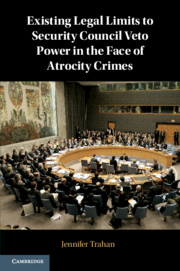Book contents
- Existing Legal Limits to Security Council Veto Power in the Face of Atrocity Crimes
- Existing Legal Limits to Security Council Veto Power in the Face of Atrocity Crimes
- Copyright page
- Contents
- Foreword
- Acknowledgments
- Introduction
- 1 The Origins and History of the Veto and Its Use
- 2 Acting in the Face of Atrocity Crimes
- 3 Initiatives to Voluntarily Restrain Veto Use in the Face of Atrocity Crimes
- 4 Questioning the Legality of Veto Use in the Face of Genocide, Crimes against Humanity, and/or War Crimes
- 5 Case Studies
- Index
5 - Case Studies
Veto Use Related to the Situation in Syria and Veto Threats Related to the Situation in Darfur
Published online by Cambridge University Press: 15 August 2020
- Existing Legal Limits to Security Council Veto Power in the Face of Atrocity Crimes
- Existing Legal Limits to Security Council Veto Power in the Face of Atrocity Crimes
- Copyright page
- Contents
- Foreword
- Acknowledgments
- Introduction
- 1 The Origins and History of the Veto and Its Use
- 2 Acting in the Face of Atrocity Crimes
- 3 Initiatives to Voluntarily Restrain Veto Use in the Face of Atrocity Crimes
- 4 Questioning the Legality of Veto Use in the Face of Genocide, Crimes against Humanity, and/or War Crimes
- 5 Case Studies
- Index
Summary
This final chapter presents two case studies, one where the veto was utilized while atrocity crimes were being committed, and one where the veto was threatened (expressly or implicitly) while atrocity crimes were being committed. The first case study traces climbing death tolls and growing recognition that mass atrocity crimes were occurring in Syria, while Russia, sometimes joined by China, invoked the veto on thirteen separate occasions. The vetoes blocked recognition of crimes, investigation of crimes, prosecution of crimes, as well as other measures. That a significant number of resolutions that would have condemned regime and/or opposition crimes failed to pass or were significantly delayed could not have failed to send a metaphorical “green light” to the perpetrators; thus, the vetoes are partly responsible for the still unfolding human tragedy. The second case study traces climbing death tolls in the early 2000s while the Sudanese military and Janjaweed militia committed mass atrocity crimes against the Fur, Masalit, Zaghawa, and other ethnic groups in the Darfur region of Sudan. These crimes likely constituted genocide, and, at minimum, war crimes and crimes against humanity. During the key years when the crimes were occurring, China blocked by threat of the veto: initially, any imposition of sanctions on the Government of Sudan, and, permanently, any oil embargo, as well as peacekeeping that was not consensually negotiated with the Government of Sudan. Eventually, a hybrid peacekeeping mission was agreed to and deployed, but only after the height of the killing had occurred and with a weakened mandate. The Security Council’s delays and tepid approach to sanctions and peacekeeping, which significantly increased the death toll, are at least partly attributable to Chinese threats (both express and implied) to use the veto.
Keywords
- Type
- Chapter
- Information
- Publisher: Cambridge University PressPrint publication year: 2020

